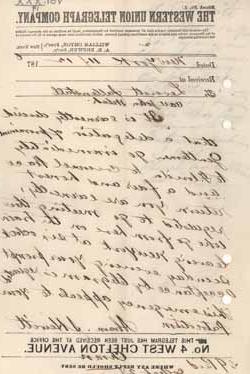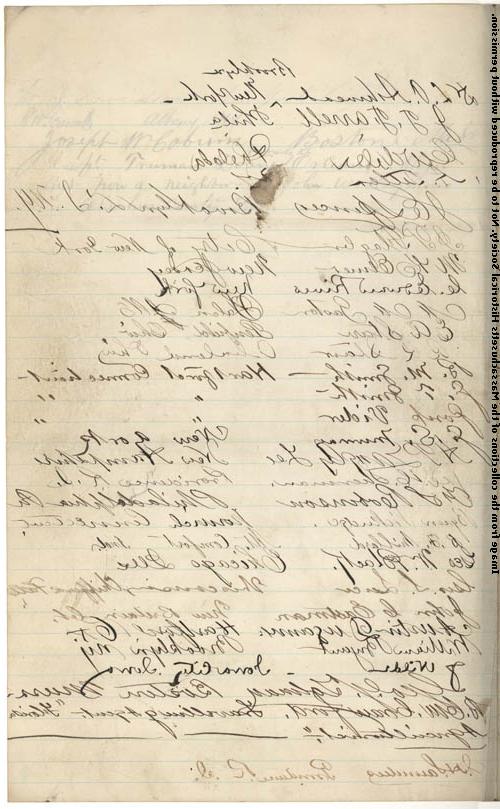Leverett Saltonstall and the Election of 1876
These documents relate to the dispute over the Florida presidential electors in the 1876 Hayes-Tilden election and the involvement of Leverett Saltonstall (1825-1895) in the controversy.
Leverett Saltonstall was the son of Leverett Saltonstall (1783-1845) and Mary Elizabeth (Sanders) Saltonstall (1788-1858). A lawyer, he was active in the Massachusetts Democratic Party and was frequently nominated as a candidate for Congress though he was never elected. In 1876, Gov. William Gaston appointed him chief Massachusetts commissioner for the Philadelphia Centennial Exposition, the first World’s Fair held in the United States.
 During the election of 1876, Saltonstall campaigned actively for Democratic presidential candidate Samuel J. Tilden. On 12 Nov. 1876, while in Philadelphia on Centennial business, Saltonstall received a telegram from the Massachusetts Democratic Committee requesting that he travel to Florida as part of a delegation to oversee the state’s election returns. A controversy had erupted in which the electoral votes in four states appeared to have been manipulated against Tilden and toward Republican candidate Rutherford B. Hayes. Tilden had defeated Hayes by popular vote and led by 19 electoral votes, but 20 votes were disputed. Florida held four of the 20 votes, and although it had originally reported for Tilden, reports of fraud and violence against Republicans led state electoral commissions to give the election to Hayes by one vote. The decision was challenged by House Democrats, who held the majority. Eventually the controversy reached such a crisis that Congress created a 15-member election commission to settle the election, and on 29 January 1877, it upheld Hayes’s election. Tilden became the first presidential candidate to lose the electoral vote while winning the popular vote, and the election of 1876 is second only to 2000 as the closest U.S. presidential election.
During the election of 1876, Saltonstall campaigned actively for Democratic presidential candidate Samuel J. Tilden. On 12 Nov. 1876, while in Philadelphia on Centennial business, Saltonstall received a telegram from the Massachusetts Democratic Committee requesting that he travel to Florida as part of a delegation to oversee the state’s election returns. A controversy had erupted in which the electoral votes in four states appeared to have been manipulated against Tilden and toward Republican candidate Rutherford B. Hayes. Tilden had defeated Hayes by popular vote and led by 19 electoral votes, but 20 votes were disputed. Florida held four of the 20 votes, and although it had originally reported for Tilden, reports of fraud and violence against Republicans led state electoral commissions to give the election to Hayes by one vote. The decision was challenged by House Democrats, who held the majority. Eventually the controversy reached such a crisis that Congress created a 15-member election commission to settle the election, and on 29 January 1877, it upheld Hayes’s election. Tilden became the first presidential candidate to lose the electoral vote while winning the popular vote, and the election of 1876 is second only to 2000 as the closest U.S. presidential election.
 Documents here include the telegram Saltonstall received from Abram S. Hewitt on 12 November 1876 asking him to go to Florida “to counsel peace and a fair and honest return,” and a 25 November letter to his wife, Rose Lee Saltonstall, describing the situation he found in Florida. There are several letters from Floridians in January of 1877 thanking him for his efforts. Saltonstall also received letters from Malcolm Hay, a Pennsylvania lawyer assigned to the investigation, and New York journalist Manton Marble. Saltonstall’s conciliatory views toward southern Democrats were challenged by J. W. Raymond in a letter to the editor of the Boston Traveller questioning Democratic Floridians’ patriotism. Raymond’s letter was answered by a petition which was signed by citizens throughout the country, defending Florida Democrats as well as Saltonstall’s service. Letters in February 1877 describe Floridians’ reaction to Raymond’s letter, and illustrate the delicate relationship between North and South during the Reconstruction Era.
Documents here include the telegram Saltonstall received from Abram S. Hewitt on 12 November 1876 asking him to go to Florida “to counsel peace and a fair and honest return,” and a 25 November letter to his wife, Rose Lee Saltonstall, describing the situation he found in Florida. There are several letters from Floridians in January of 1877 thanking him for his efforts. Saltonstall also received letters from Malcolm Hay, a Pennsylvania lawyer assigned to the investigation, and New York journalist Manton Marble. Saltonstall’s conciliatory views toward southern Democrats were challenged by J. W. Raymond in a letter to the editor of the Boston Traveller questioning Democratic Floridians’ patriotism. Raymond’s letter was answered by a petition which was signed by citizens throughout the country, defending Florida Democrats as well as Saltonstall’s service. Letters in February 1877 describe Floridians’ reaction to Raymond’s letter, and illustrate the delicate relationship between North and South during the Reconstruction Era.
![]() Telegram from Abram S. Hewitt to Leverett Saltonstall, 12 November 1876
Telegram from Abram S. Hewitt to Leverett Saltonstall, 12 November 1876
![]() Letter from Leverett Saltonstall to Rose Lee Saltonstall, 25 November 1876
Letter from Leverett Saltonstall to Rose Lee Saltonstall, 25 November 1876
![]() Letter from Malcolm Hay to Leverett Saltonstall, 9 January 1877
Letter from Malcolm Hay to Leverett Saltonstall, 9 January 1877
![]() Letter from C. E. Dyke to Leverett Saltonstall, 11 January 1877
Letter from C. E. Dyke to Leverett Saltonstall, 11 January 1877
![]() Letter from Manton Marble to Leverett Saltonstall, 13 January 1877
Letter from Manton Marble to Leverett Saltonstall, 13 January 1877
![]() Letter from Wilkinson Call to Leverett Saltonstall, 14 January 1877
Letter from Wilkinson Call to Leverett Saltonstall, 14 January 1877
![]() Letter from Florida supporters to the editor of the Boston Traveller, 27 January ...
Letter from Florida supporters to the editor of the Boston Traveller, 27 January ...
![]() Letter from R. F. Taylor to Leverett Saltonstall, 6 February 1877
Letter from R. F. Taylor to Leverett Saltonstall, 6 February 1877
![]() Letter from John Thompson to Leverett Saltonstall, 8 February 1877
Letter from John Thompson to Leverett Saltonstall, 8 February 1877
